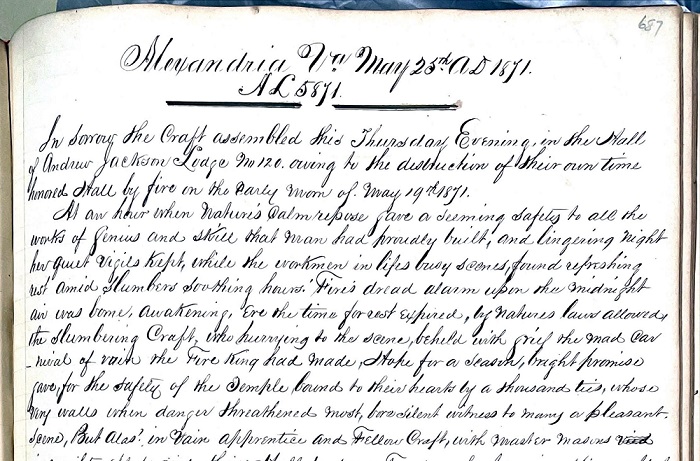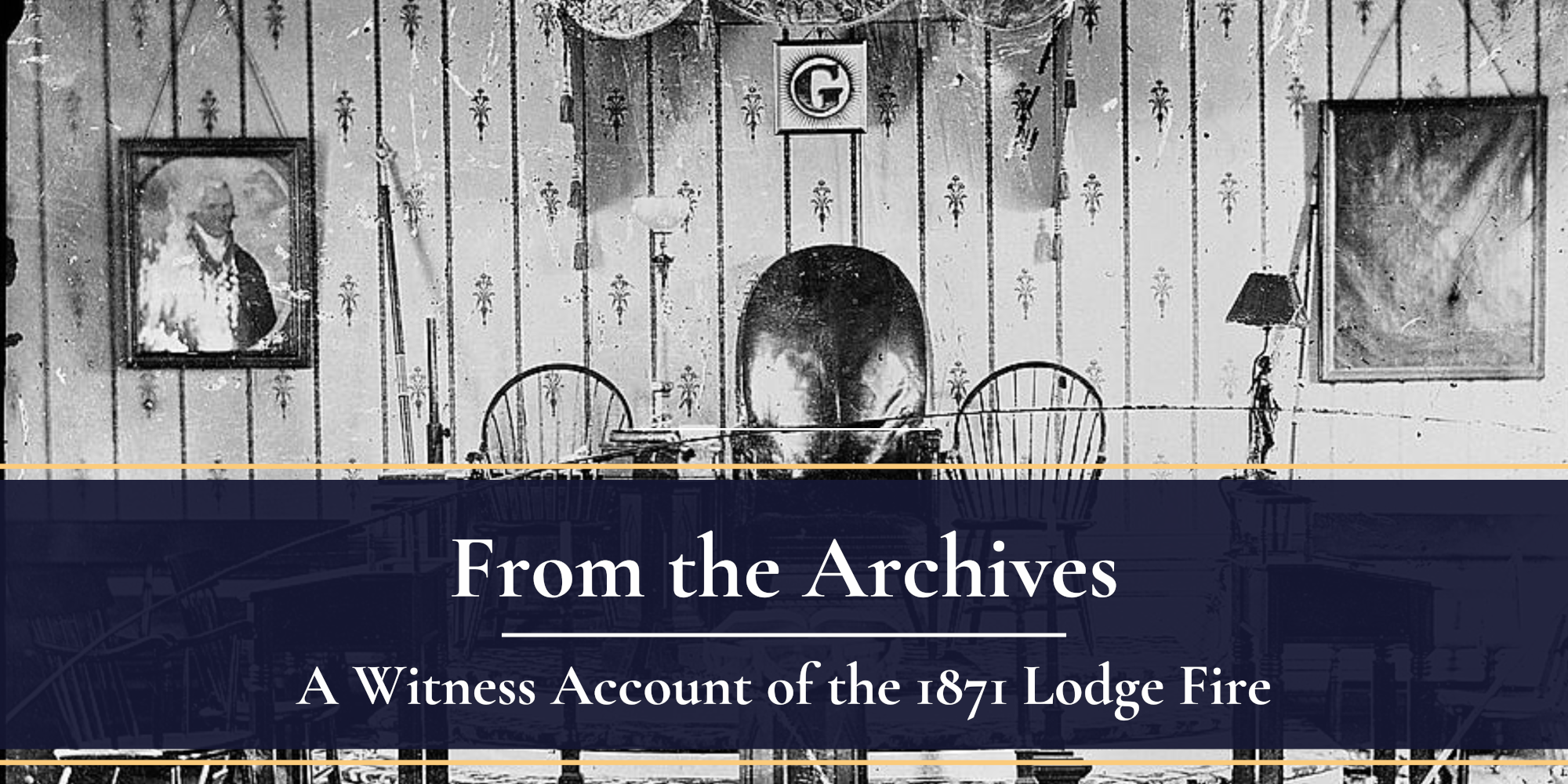From the Archives is a recurring series that highlights Alexandria-Washington Lodge’s archives and museum. Visitors are welcome to visit the museum during the memorial’s operating hours.
Written by Chris Ruli, Archives Committee
 In the early morning of May 19, 1871, the townspeople of Alexandria awoke to the sounds of alarms. A fire erupted inside the city hall, which also served as a lodge space and museum operated by Alexandria-Washington Lodge No. 22 (AW22). The lodge’s members quickly arrived at the scene to help suppress the conflagration, which had spread to most of the building and threatened to destroy the entire lodge hall and museum – home to one of the earliest museums in the United States. They worked quickly to secure hundreds of priceless relics and documents on Freemasonry, politics, science, art, and popular culture. Although they were able to save a significant number of items, including the lodge’s proceedings and much of the Washingtoniana – the collection of memorabilia associated with George Washington, much of the museum’s natural science and art collection was lost.
In the early morning of May 19, 1871, the townspeople of Alexandria awoke to the sounds of alarms. A fire erupted inside the city hall, which also served as a lodge space and museum operated by Alexandria-Washington Lodge No. 22 (AW22). The lodge’s members quickly arrived at the scene to help suppress the conflagration, which had spread to most of the building and threatened to destroy the entire lodge hall and museum – home to one of the earliest museums in the United States. They worked quickly to secure hundreds of priceless relics and documents on Freemasonry, politics, science, art, and popular culture. Although they were able to save a significant number of items, including the lodge’s proceedings and much of the Washingtoniana – the collection of memorabilia associated with George Washington, much of the museum’s natural science and art collection was lost.
Six days later, on May 25, members assembled in a temporary lodge space to discuss their future. In lieu of the standard minutes usually recorded, the lodge’s secretary drafted a powerful recollection of the fire, written in compelling prose.The following is a full reproduction of his remarks, which provides readers with an emotional account of the May 19 fire and the lodge’s attempt to rescue their history from total destruction.
In sorrow the Craft assembled this Thursday evening (May 25th) in the hall of Andrew Jackson Lodge No. 120 owing to the destruction of their own time-honored hall by fire on the early morn. of May 19, 1871.
At an hour when nature’s calm repose gave a seeming safety,
To all the works of genius and skill that man had proudly built,
And lingering night her quiet vigils kept,
While the workmen in life’s busy scenes found refreshing rest,
And made slumbers’ soothing hours.
Fire’s dread alarm upon the midnight air was borne,
Awakening, ere the time for rest expired,
By nature’s laws allowed the slumbering craft who hurrying to the scene,
Beheld with grief the mad carnival of rain the Fire King had made,
Hope for a season, bright promise, gave for the safety of the temple,
Bound to their hearts by a thousand ties,
Whose very walls when danger threatened most,
Bore silent witness to many a pleasant scene,
But alas! In vain,
Apprentice and fellow craft with master masons,
In mighty efforts vied, their hall, to save!
For soon the towering spire, which for years,
Had like a faithful guardian stood in proud majesty at the temple porch,
Sounding its own death knell at the hour of one,
From its brazen thatch gave taken by its mighty fall,
That the unchecked demon gathering new strength from the harm it had made,
With ere long enwrap beneath its fiery arms all within their reach,
Near and near still it’s heated breath, porch and temple approached,
Which soon in burning shrouds helpless victims lay,
With madly darking flames,
The only lights for sepulcher,
Which high to heaven ascends,
As if in mockery of the feeble efforts of the craft to avert their doom,
Soon the blackened walls, like grim specters remained,
Sad monuments of the joys and pleasures,
The Craft had known within their honored hall,
Whose falled altars, the new born day, a silent language gave,
That in gloomy ancients words of sorrow spoke,
To the heart of every brother that lingered there,
As if loth to leave the mournful scene,
Where once with kindred spirits they had happy been.
One ray of comfort they cherished then in that hour of gloom,
The safety of all they prized beyond the temple they had lost,
Whose value association gave,
And whose loss the wealth of India could ne’er replace,
The charter, that bore the immortal name that was not “born to die,”
The chair in which our first illustrious master sat,
Crowned by a diadem of glory woven by a nation’s love,
And letters of fraternal council by him to our fathers sent,
Portraits of the honored dead,
That adorned the temple walls,
And objects held most dear,
were from destruction’s grasp,
By anxious daring brothers saved.
To serve again as mementos of the past,
Valued once but two fold cherished now,
That they are linked in memory’s chain,
With objects forever lost.
And soon we hope shall severe again,
That temple to adorn,
Which willing hearts and active hands,
Shall build a glorious Phoenix,
Magnificent in design,
A fit monument to keep,
Alive the Glorious of the past,
That filled the fallen temple,
From whose ashes it shall arise.
Due to the building’s importance in local business and civic affairs, lodge members joined the town’s council and merchants to fundraise and immediately rebuild the hall. Adolf Cluss, a prominent local architect and Freemason, was selected to lead the project and rebuilt the edifice exactly as it stood before the incident with few notable exceptions. Cluss reinforced the hall’s interior with steel beams and stone to make it fireproof and worked with AW22 to build an expanded museum and lodge room. Alexandria-Washington occupied this space until 1945 when it moved over to the George Washington Masonic National Memorial.



